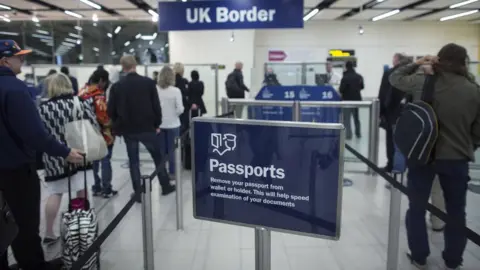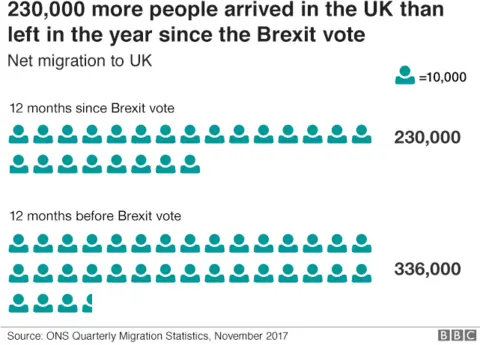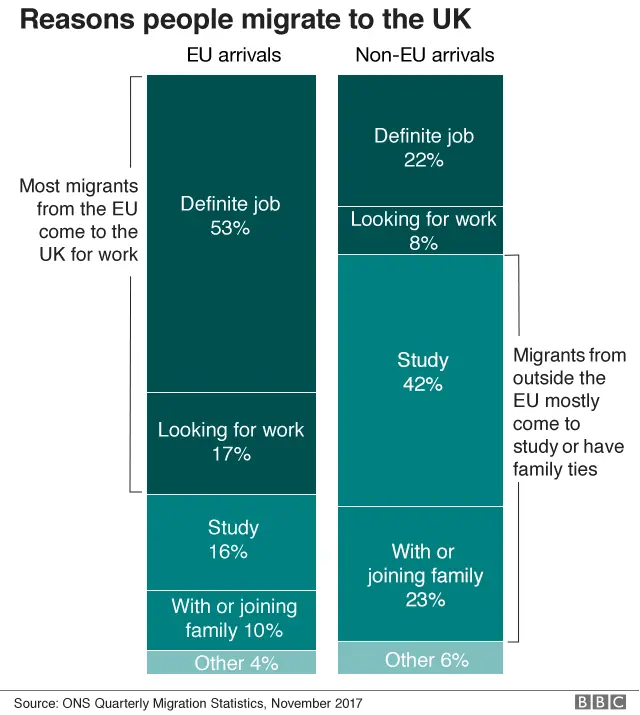Brexit: What's happening to migration?
 Getty Images
Getty ImagesIs something rather profound starting to happen to migration to and from the UK? Are we now seeing a Brexit effect in who wants to come, stay, or leave the country?
First off, the headline. Net migration is estimated to have fallen by nearly a third to 230,000 in the year to June.
That's 106,000 down on the year before the referendum - and it's the biggest decline since records began in 1964.

The number of EU citizens coming to work in the UK still exceeds those who emigrate - but the rate has slowed in the last 12 months.
However, there have been falls in net migration from the three key groups of EU nationals:
- There were 30,000 fewer people from the "EU 15", which includes the wealthiest nations
- A total of 34,000 fewer from the "EU 8" - which refers to the poorer central and eastern Europe members
- There were falls in arrivals from Romania and Bulgaria - the "EU 2" - but statisticians don't consider it statistically significant, so it could easily rise again
What's the long term picture?
The UK suffered a small loss in population during the 1970s and part of the 1980s, as many people moved abroad looking for better conditions. As the UK has generally prospered, the process went into reverse: we began attracting people, rather than losing.
So the UK has experienced more immigration than emigration since the early 1990s.
That's coincided with both the growth of the UK and the falling of political barriers such as the Iron Curtain. But it's also been influenced by cuts in red tape that once prevented British companies easily picking and choosing from foreign workers.
The second big spike occurred when 10 new and poorer nations joined the EU in 2004.
The UK, unlike its key European competitor Germany, chose to allow these workers into our labour market despite having the right under EU rules to say no. There was another smaller jump in 2014 when Romania and Bulgaria finally joined the club.
Be that as it may, the UK has been significantly changed by migration.
For anyone who grew up in the 60s and 70s, mass migration tended to refer to people who came to the UK to work from south Asia and the Caribbean. Today, there are more EU nationals in the UK than from the rest of the world.
The biggest group is from Poland - followed by Romania and Republic of Ireland. EU nations make up eight of the top 10. But is this now changing?

Are we now seeing a Brexodus?
Two specialist law firms that handle visas for major employers - Fragomen and Laura Devine Solicitors - say their clients are finding it harder to recruit the right people from abroad to fill skills gaps in their workforces.
There is a fear that higher skilled workers are leaving - and that may be reflected in the increase in departures of citizens from the wealthiest EU nations.
There are still more Europeans arriving than leaving - 107,000 to be exact - and the vast majority come to work, but their character is changing.
Proportionally more of those arriving than before have a definite job already lined up. Fewer are coming over in the hope of finding work - the stereotypical Polish plumber who's been told by his friends there's good money to be made.

And it appears other factors may also be at play.
The European economies are growing - which means there are more opportunities at home than there were a decade ago.
At the same time, the pound is weaker. Quite simply, if you are sending money home to your family - a key reason why many people migrate to work - it may not be worth it any more.